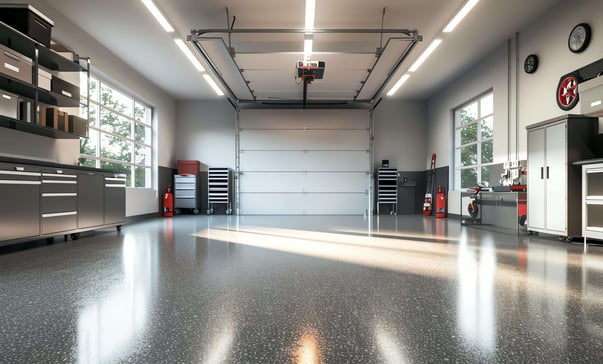Basement
Basements have evolved from dark, musty storage spaces to functional, stylish extensions of our homes. As homeowners seek to maximize their living areas, choosing the right flooring becomes crucial. Epoxy flooring, renowned for its durability, aesthetic appeal, and low maintenance, stands out as a top choice for basements. In this guide, we’ll delve into why epoxy flooring is ideal for basements, the benefits it offers, the installation process, and how to maintain it for years to come.
Benefits of Epoxy Flooring for Basements
Durability and Longevity: Epoxy flooring is highly durable and can withstand heavy foot traffic, making it perfect for basements used as gyms, playrooms, or workshops. Its resistance to impacts and abrasions ensures that the floor remains in top condition for years.
Water and Moisture Resistance: Basements are prone to dampness and flooding. Epoxy creates a waterproof barrier, preventing moisture from seeping into the concrete and causing damage or mold growth. This makes it an excellent choice for areas with high humidity or water issues.
Easy Maintenance: Cleaning epoxy floors is a breeze. Spills and stains can be wiped away with a simple mop or cloth, and the smooth surface resists dust and dirt accumulation. This low-maintenance feature is particularly beneficial for basements that serve multiple purposes.
Aesthetic Appeal: Epoxy flooring comes in a variety of colors, patterns, and finishes, allowing homeowners to customize their basements to match their personal style. Whether you prefer a glossy, high-shine finish or a matte look, epoxy can deliver.
Chemical Resistance: If you use your basement as a workshop or storage area for household chemicals, epoxy flooring’s resistance to chemicals and solvents will prevent damage and deterioration.
Improved Safety: Epoxy coatings can be mixed with anti-slip additives to enhance safety, especially in basements that may be exposed to water. This reduces the risk of slips and falls, providing peace of mind for families with children or elderly members.
The Epoxy Flooring Installation Process
Installing epoxy flooring in your basement involves several key steps:
Preparation: Proper surface preparation is crucial for the success of an epoxy floor. This involves cleaning the concrete slab thoroughly to remove any dirt, grease, or old coatings. Cracks and holes must be repaired to create a smooth, even surface.
Moisture Testing: Basements are susceptible to moisture issues, so it’s important to test the concrete for moisture content. Excessive moisture can prevent the epoxy from adhering properly. If moisture is detected, a vapor barrier may be required before applying the epoxy.
Primer Application: A primer coat is applied to the prepared surface to enhance adhesion. This layer penetrates the concrete, creating a strong bond between the floor and the epoxy coating.
Mixing and Application: The epoxy resin and hardener are mixed according to the manufacturer’s instructions. The mixture is then applied to the floor using rollers or brushes, ensuring an even, consistent layer. Depending on the desired thickness and finish, multiple coats may be applied.
Curing: After application, the epoxy needs time to cure and harden. This process can take anywhere from 24 to 72 hours, depending on the product and environmental conditions. It’s essential to avoid walking on the floor during this period to prevent any damage.
Finishing Touches: Once cured, optional topcoats or sealers can be applied to enhance the durability and appearance of the epoxy floor. These finishing touches provide additional protection against scratches and UV damage.
Maintenance Tips for Epoxy Flooring
Regular Cleaning: Keep your epoxy floor looking its best with regular cleaning. Sweep or vacuum the surface to remove dirt and debris, and mop with a mild detergent and water solution to tackle spills and stains.
Avoid Harsh Chemicals: While epoxy floors are resistant to many chemicals, it’s best to avoid using harsh cleaners or abrasive pads that can damage the surface. Stick to gentle cleaning solutions and soft cloths or mops.
Protective Measures: Use furniture pads under heavy items to prevent scratches and dents. Place mats or rugs at entryways to catch dirt and moisture before they reach the epoxy floor.
Address Spills Promptly: Although epoxy is highly resistant to stains, it’s a good practice to clean up spills as soon as they occur. This prevents any potential discoloration or damage to the finish.
Regular Inspections: Periodically inspect your epoxy floor for any signs of wear, damage, or lifting. Addressing small issues promptly can prevent more extensive repairs in the future.
Epoxy flooring is an excellent choice for transforming your basement into a functional, attractive, and low-maintenance space. Its durability, resistance to moisture and chemicals, and customizable aesthetics make it a versatile solution for various basement uses. By following proper installation and maintenance practices, you can enjoy the benefits of epoxy flooring for many years, enhancing the value and usability of your home.
Investing in epoxy flooring for your basement not only improves the overall look of the space but also provides a long-lasting, practical solution that can withstand the challenges of basement environments. Whether you’re converting your basement into a cozy family room, a productive home office, or a creative workshop, epoxy flooring will deliver the performance and style you need.
Frequently asked questions
What are the benefits of epoxy flooring in a basement?
Epoxy flooring offers numerous benefits for basements, including high durability, moisture and mold resistance, easy maintenance, improved aesthetics, and enhanced safety. These features make it ideal for basements, which are often prone to dampness and require durable, low-maintenance flooring solutions.
Can epoxy flooring be installed in a damp basement?
Yes, epoxy flooring can be installed in a damp basement, but it's crucial to address any moisture issues first. Proper moisture testing and potentially applying a vapor barrier are necessary steps to ensure the epoxy adheres properly and prevents future moisture problems.
How long does epoxy flooring last in a basement?
When properly installed and maintained, epoxy flooring can last 10 to 20 years or more in a basement setting. Its longevity depends on factors such as the quality of the epoxy, the level of foot traffic, and how well the floor is cared for.
Is epoxy flooring safe for basements?
Epoxy flooring is safe for basements. Once cured, it is non-toxic and its seamless, non-porous surface helps prevent the growth of mold and bacteria. Additionally, epoxy flooring can be made slip-resistant by adding anti-slip additives during installation, enhancing safety in the basement.
What is the cost of installing epoxy flooring in a basement?
The cost of installing epoxy flooring in a basement can vary based on factors such as the size of the area, the complexity of the installation, and the type of epoxy used. On average, homeowners can expect to pay between $3 and $12 per square foot for professional installation. Obtaining a detailed quote from a reputable installer is recommended to understand the specific costs for your project.
How do I maintain epoxy flooring in my basement?
Maintaining epoxy flooring in a basement is straightforward. Regularly sweep or vacuum to remove dirt and debris. For deeper cleaning, use a mild detergent and water solution and mop the floor. Avoid using harsh chemicals or abrasive cleaners that could damage the epoxy surface. Promptly clean up spills to prevent stains and inspect the floor periodically for signs of wear or damage.

"Our new epoxy garage floor is fantastic! Not only does it look stunning, but the cleanup is a breeze. We couldn’t be happier with the professionalism and quality work provided by the team."
— Samantha L.
"We opted for epoxy flooring for our restaurant, and the results have exceeded our expectations. The floor’s resistance to heavy foot traffic and spills has made our day-to-day operations much smoother. The vibrant finish also really pops and enhances our interior decor."
— Marco D., Restaurant Owner
After installing epoxy flooring in our manufacturing facility, we've noticed a significant improvement in maintenance and cleanliness. The anti-slip surface has enhanced safety for our employees, and the durability is exactly what we need in such a demanding environment."
— Jameson Industrial Solutions




